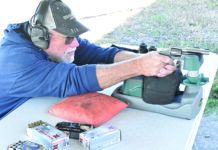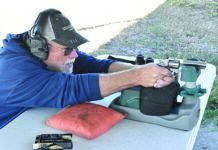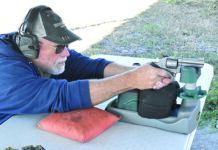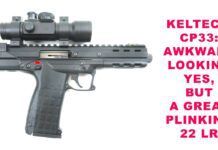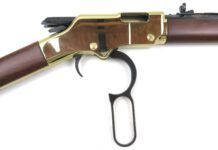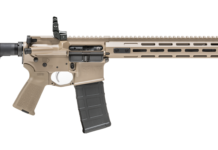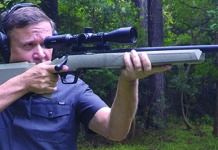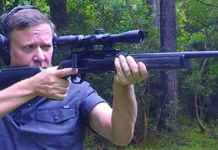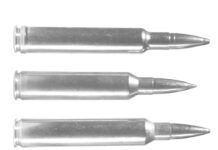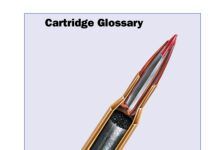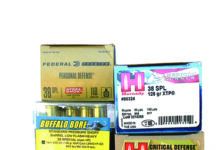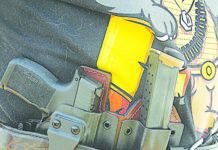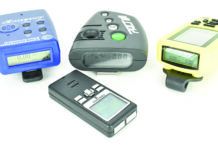Slide- or pump-action 22 rimfire rifles pack a lot of fun into a Saturday-afternoon plinking session. They also make handy small-game hunting rifles for squirrels and rabbits. A few generations ago, pump-action 22s were used at shooting galleries and arcades. Traveling fairs and carnivals would set up the range with small cast-iron targets, and anyone who paid the cost to play could plink away for bragging rights or to win a prize for their sweethearts. Many of those rifles were Winchesters loaded with 22 Short ammo. They had minimal recoil and noise. Since those days, the rifle and ammo have been replaced by BB and water guns at fairs and carnivals.
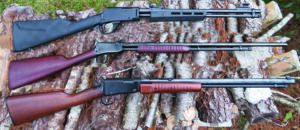
Finding new pump-action 22s wasn’t exactly easy, even though pump-action 22 rimfires are a long-standing American tradition. Rossi recently introduced the Gallery 22 in two models, a classic hardwood-stock model and a modernized polymer model (RP22181SY). We opted for the polymer pump. Henry offers a new Pump Action Octagon (H003T) with classic wood-and-steel construction that looks vaguely reminiscent of Winchester pumps of yore. For our third rifle we found a used, but like new, Taurus Model M62R, which is a Brazilian clone of the American-made Winchester Model 62. Close your eyes and handle the Taurus, and you will think it is a Winchester.
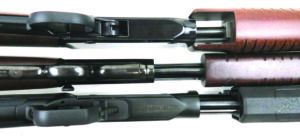
These rifles uses a manual slide- or pump-action to fire, eject, and reload the chamber, same as a pump-action shotgun. One big difference, however, is the external hammer. On the rearward pump, the bolt slides out the rear of the receiver to cock the hammer. If you have your grip close to the hammer, you may whack your thumb on the bolt during the rearward stroke of the pump. That’s the reason why exposed-hammer shotguns are called “thumb busters.” The bolt movement on a pump-action 22 is less than a 12-gauge shotgun, but still be warned. We were reminded of this when we tried to open the bolt using the slide release when the Rossi was cocked. Because the trigger guard is oversized, some of us choked up on the grip when we cleared the action and whacked our thumb. With the Rossi and Henry rifles, you can only operate the pump when the hammer is fully forward in the fired position or at quarter or half cock. You need to use the slide release when the hammer is cocked to cycle the action. On the Taurus, you can operate the slide if the hammer is cocked or not.

In addition to the exposed hammer, other common features of these three rifles are open sights, straight-grip stocks, and tube magazines. The Rossi and Henry both have 3⁄8-inch grooved receivers, making them optics ready. They also spit out empties from the side. The Taurus is old-school with top ejection and no easily way to mount a scope. To keep the playing field level, we opted to test the rifles using open sights, and we can say that at 20 yards, these rifles are capable of shooting one ragged hole if you do your part. In addition to accuracy, we looked at ease of use, such as the slickness of the pump and balance of the rifle. We also looked at safety features and compatibility with other 22 rimfire ammo. All of the rifles were fed a diet of 22 LR shells, and we gave bonus points to Henry and Rossi because they cycled 22 Short ammo. Note that Rossi does not indicate the Gallery 22 functions with 22 Short ammo, but we tried them anyway in limited use. In reality, nearly any 22 LR rifle is compatible with 22 Long and 22 Short ammo. The question is whether the shorter ammo will cycle in the rifle. Your pump action may turn into a single shot with 22 Shorts, as did the Taurus. Another note we have mentioned before with 22 LR guns, continuous use of 22 Shorts will build up carbon in the chamber and may cause extraction problems when switching to 22 Long Rifle. Best practice is to clean the chamber and bore after use. The downside with a pump action is they are not easy to clean, unless the rifle is a takedown like the Taurus.
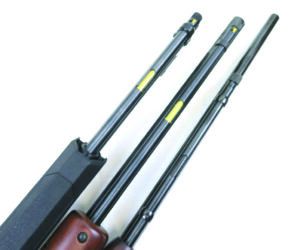
To load the tubular magazines, you twist the end of the inner magazine tube and pull it out the just enough to access the loading port. No need to pull it out all the way since oils from your hands can corrode the inner tube, and you do not want to get debris or dust on it. The loading ports on all of the rifles are cut in the shape of a cartridge, so we knew which way the cartridge dropped in. We mixed up LR ammo in the magazines to see if we could choke any of these pumps, but all ran strong eventually. The Rossi jammed a few times initially, and we’ll get into it more detail later.
For accuracy testing, we aimed at 3-inch bullseye Splatter Targets at 20 yards. The black open sights on the rifles were fairly easy to see on these targets because the bullseye is black with a red center. Our range bag doubled as a rest. The 22 LR ammunition started with our plinking go-to round, Remington Thunderbolts with 40-grain lead-roundnose bullets. For hunting ammo, we fed the pumps Winchester Xpert HV with 36-grain HP bullets and CCI Velocitor with 40-grain copper-plated hollowpoint bullet. Our 22 Short ammo was CCI Target loaded with a 29-grain LRN bullet. The factory muzzle velocity of the CCI ammo shows the difference between the LR and Short cartridges, 1435 fps and 830 fps, respectively. Our speed-checking chronograph, however, told the real story. Muzzle velocity was slower than the factory stated.
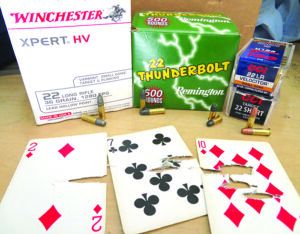
We used an 8-inch paper plate set at 20 yards for our fast-shooting test. We pumped and pressed the trigger as fast as we could. With all three rifles, it was easy to keep shots on the plate. We also found the Taurus is mechanically similar to the Winchester in that we could slam-fire the rifle, which we’ll get into.
With five-shot groups measuring less than an inch at 20 yards, accuracy was super. In fact we channeled our trick-shooting mojo and sliced playing cards with all three rifles. It was easier with the Taurus and Henry than with the Rossi due to the heavy sights on the Gallery 22.
We liked all of these rifles and would happily plink away our life savings with any of them, but the devil is in the details. Here’s the bottom line from our test team on these fast-shooting pump actions 22s.
Gun Tests Grade: A- (BEST BUY)
$270
The Gallery 22 gives the old-time look of a Gallery Gun a makeover in polymer, oversized trigger guard, and fiber-optic sights. The buttstock is black polymer with a straight pistol grip, angular cheekpiece, and finely serrated plastic buttpad that was fitted okay. There was some overlap in spots. There is also a sling-swivel stud in the stock, but there is no stud toward the business end. What are we supposed to do? Drag the Gallery 22, not shoulder it? The wood-stock model has a forward sling stud combined with the barrel band. The fore end is also polymer and has three M-Lok slots on each side of the fore end so you can attach an accessory, such as a tactical light or a forward sling stud. We liked the updated look but question the practicality of using a light on this rimfire. Perhaps for raccoon hunting at night? A light attached to the fore end would be helpful for that pursuit. The pistol-grip area and the area under the fore end had a fine texture for a better grip when cycling the action.
| Action Type | Pump/slide action, hammer-fired |
| Overall Length | 35.9 in. |
| Overall Height | 7.0 in. |
| Weight Unloaded | 5.1 lbs. |
| Weight Loaded | 5.2 lbs. |
| Barrel Length/Twist Rate | 18.0 in.; 1:16 RH twist |
| Barrel | Blued steel |
| Receiver | Matte-black alloy |
| Buttstock | Textured polymer, serrated plastic buttpad, straight pistol grip |
| Buttstock Length of Pull | 13.6 in. |
| Fore End | Smooth black polymer |
| Magazine | Tube, 15 rounds (22 LR) |
| Front Sight | Red fiber-optic post |
| Rear Sight | Green-dot fiber optic, fully adjustable |
| Sight Radius | 13.1 in. |
| Trigger Pull Weight | 6.0 lbs. |
| Safety | Cross bolt, half cock hammer, trigger disconnect |
| Warranty | 1-year limited warranty |
| Telephone | (800) 948-8029 |
| Website | RossiUSA.com |
| Made In | Brazil |
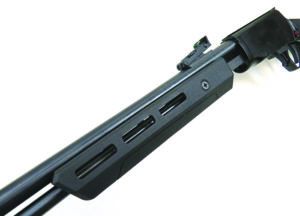
The receiver cover is made of some lightweight metal — our guess is zinc alloy — and is painted matte black. The receiver cover is grooved for 3⁄8-inch rings. The Phillips screws holding the fore end to the slide and the receiver cover to the receiver are a different finish color. But that’s just a nit. The oversized trigger guard is polymer, giving the Gallery 22 a modern look. It is practical for use when wearing gloves, too. The action-lock button has coarse serrations and is easy to manipulate, though we did whack our thumbs when we choked up on the pistol grip to operate the action lock button with our trigger finger. It was a stretch. This happened once, then we learned our lesson. A cross bolt is above the trigger and set up for a right-handed shooter. A red ring appears on the left side, telling the user the rifle is ready to fire.
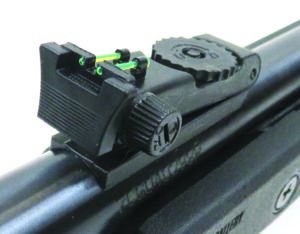
The exposed hammer has plenty of fine serrations to confidently cock the hammer back with no slippage. The hammer also has a half-cock safety, and there is a trigger disconnect built into the mechanism to prevent slam fires.
The heavy 18-inch barrel gives the Rossi some heft. It weighs 5 pounds unloaded and balances on the support hand, so it is a bit muzzle heavy. The front sight is hooded with large cutouts all around the hood to juice up the red fiber-optic-tube-post sight. The cutouts allow light to get to the fiber optic and protect the fiber-optic tube in case the rifle is accidentally dropped. The hood slides off. The rear sight is fully adjustable, with clear indicators for up/down and left/right. You can adjust windage with the rim of a spent 22 LR cartridge. For elevation, there is a built-in dial with notched edges. The rear notch features green-fiber-optic tubes on either side of the notch. We thought these sights were easy to use and liked the contrast between the dot colors, but when it came to splitting a playing card, we though the sights were too chunky. Though the “2 of diamonds” playing card would say otherwise.
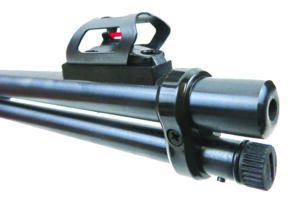
During accuracy testing of the Rossi, we had a few light primer hits with the Remington and Winchester ammo. After we cycled through a few magazines of ammo, the issue went away. We had one FTE (failure to eject) jam that required the use of our EDC knife to dislodge the stuck case. Another small issue that resolved itself was the inner magazine tube hung up on the flat-tipped Winchester ammo.
By our third tube of ammo, the Rossi was cooking. Our best five-shot group was with the Winchester Xpert rounds and measured 0.45 inch. The Velocitors came in second with a 0.66-inch group average, and the Remington group nearly doubled in size over the Winchester with 0.80-inch groups. Though the barrel is not stamped 22 Short, we still loaded them in the tube and found the CCI Target rounds gave us a group of 0.71 inch. The Rossi was the least accurate of the rifles tested, but it was still okay.
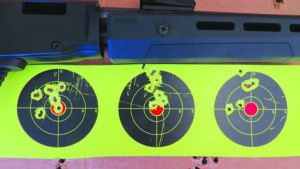
The two-stage trigger has about a quarter-inch of take up in the first stage, then a bit of creep in the second stage. Trigger-pull weight averaged an even 6 pounds. We think a lighter pull weight would help increase accuracy. Recoil with the shorts was nil, as was the muzzle report. The LR ammo was slightly louder and offered a tad more recoil. Shooting for speed, the red-fiber-optic dot was easy to track on the black targets and the white paper plate. If the shooter held the trigger and pumped the fore end, the hammer would fall forward but not fire. The shooter needs to release the trigger prior to the forward pump to reset the trigger.
Our Team Said: In our opinion, the Gallery 22 is a Best Buy if you are looking to get into a 22 rimfire pump-action rifle at minimal cost. We liked the updated look of the polymer stock and fore end and oversized trigger guard. The fiber-optic sights are good. We’d swap out the barrel band for one that has a sling swivel stud ($6; ShopRossi.com) if we owned this rifle.
22 LR Range Data
To collect accuracy data, we fired five-shot groups from a bench using a rest. Distance: 20 yards with open sights. We recorded velocities using a ProChrono digital chronograph set 15 feet from the muzzle.| Remington Thunderbolt 40-grain LRN | Rossi Gallery | Taurus M62R | Henry Pump Action |
| Average Velocity | 1188 fps | 1203 fps | 1116 fps |
| Muzzle Energy | 125 ft.-lbs. | 129 ft.-lbs. | 111 ft.-lbs. |
| Smallest Group | 0.80 in. | 0.31 in. | 0.33 in. |
| Average Group | 0.83 in. | 0.35 in. | 0.39 in. |
| Winchester Xpert HV 36-grain HP | Rossi Gallery | Taurus M62R | Henry Pump Action |
| Average Velocity | 1252 fps | 1249 fps | 1198 fps |
| Muzzle Energy | 125 ft.-lbs. | 125 ft.-lbs. | 115 ft.-lbs. |
| Smallest Group | 0.45 in. | 0.70 in. | 0.24 in. |
| Average Group | 0.55 in. | 0.72 in. | 0.30 in. |
| CCI Velocitor 40-grain CPHP | Rossi Gallery | Taurus M62R | Henry Pump Action |
| Average Velocity | 1323 fps | 1203 fps | 1358 fps |
| Muzzle Energy | 155 ft.-lbs. | 164 ft.-lbs. | 164 ft.-lbs. |
| Smallest Group | 0.66 in. | 0.53 in. | 0.48 in. |
| Average Group | 0.79 in. | 0.57 in. | 0.52 in. |
22 Short Range Data
To collect accuracy data, we fired five-shot groups from a bench using a rest. Distance: 20 yards with open sights. We recorded velocities using a ProChrono digital chronograph set 15 feet from the muzzle.| CCI Target 29-grain LRN | Rossi Gallery | Taurus M62R | Henry Pump Action |
|---|---|---|---|
| Average Velocity | 843 fps | 870 fps | 817 fps |
| Muzzle Energy | 46 ft.-lbs. | 49 ft.-lbs. | 43 ft.-lbs. |
| Smallest Group | 0.71 in. | 0.53 in. | 0.45 in. |
| Average Group | 0.76 in. | 0.58 in. | 0.50 in. |
Value Guide: 22 Rifle Rankings (Various Actions)
| Gun Name | Issue | Grade | Comments |
|---|---|---|---|
| Bergara B14R 22 LR, $950 | June 2022 | A | Our Pick. The Bergara was ready to perform right out of the box. Heaviest, most accurate, most expensive. |
| Christensen Ranger 22 22 LR, $830 | June 2022 | A | Were we to grade this quartet strictly for hunting, the Christensen would win running away. |
| Tikka T1X 22 LR, $519 | June 2022 | B+ | Best Buy. The most pedestrian of the rifles tested in this group, the Tikka would be suited for hunting afield. |
| Ruger Precision Rimfire 8401 22 LR, $480 | June 2022 | B | Lots of features that should bring a smile to the face of competitive shooters. Would like to see more accuracy. |
| Henry Golden Boy Model H004 22 S/L/LR, $500 | Feb. 2022 | A | Our Pick. The Golden Boy Henry shines. It is heavy and has a very smooth operating lever. |
| Rossi Rio Bravo RL22181WD 22 LR, $300 | Feb. 2022 | A | Best Buy. Bravo to the Rio Bravo. The test rifle was accurate, lightweight, and had a smooth-cycling lever. |
| Chiappa LA322 Standard Carbine 920.383 22 LR, $290 | Feb. 2022 | D | The LA322 had several failures to feed and showed some soft firing-pin hits. |
| Browning BL-22 Grade I 024100103 22 S/L/LR, $700 | Sep. 2021 | A- | Our Pick. The fit and finish were superb, and that is reflected in the cost. Accuracy was the best of the three. |
| Henry Classic Lever Action 22 H001 22 S/L/LR, $386 | Sep. 2021 | A- | Best Buy. The Classic 22 Lever Henry is well made, fun to shoot and inexpensive. Accuracy was good. |
| Taylor’s & Co. Scout RIF/2045 22 LR, $594 | Sep. 2021 | A- | Styled after a resized Winchester Model 1873. We liked the option of adding an optic. Silver finish is striking. |
| Savage Model 64 Takedown 40207 22 LR, $212 | Sep. 2020 | A | Best Buy. Basically a Model 64 barrel and action attached to an abbreviated polymer stock. |
| Ruger 10/22 Takedown 11100 22 LR, $372 | Sep. 2020 | A | Our Pick. This has all the performance the iconic 10/22 is known for in a compact package. |
| KelTec Model SU22CA 22 LR, $373 | Sep. 2020 | A- | While not a true takedown rifle, the folding stock on the SU-22CA makes it easy to stow and go. |
| Smith & Wesson M&P 15-22 22 LR, $500 | Mar. 2020 | A | Best Buy. The Smith & Wesson M&P 15-22 operated as we wanted and shot well. It won’t break the bank. |
| Walther Arms HK416 D145RS 578.03.01 22 LR, $583 | Mar. 2020 | B | If you’re looking for an M27 clone, this one is worth thinking about. |
| Anschütz MSR RX22 22 LR, $900 | Mar. 2020 | C | The Anschütz RX22’s trigger wasn’t the best, its buttpad fell off repeatedly, and no one liked its open sights. |
| ISSC MK22 ISSC211000 22 LR, $270 | Mar. 2020 | F | Showed ongoing failures to feed and extract. The blems on the sides of the receiver put us off. |
| German Sport Guns GSG-StG44 GERGSTG44 22 LR, $330 | Feb. 2020 | A | Our Pick. The action had very similar stampings to what you would find on the historical firearm. |
| Walther Arms Colt M4 Carbine 5760300 22 LR, $350 | Feb. 2020 | B | The Walther Arms Colt 22 LR M4 looks almost identical to the standard-issue Colt centerfire rifle. |
| Walther Arms HK MP5 A5 5780310 22 LR, $390 | Feb. 2020 | C | As tested, the stock limited the enjoyment of the firearm and was completely unacceptable for the price. |
| Chiappa Citadel CIR22M1W 22 LR, $300 (Two guns) | Feb. 2020 | F, C | While the Chiappa looks very similar to a classic M1 Carbine, too many of the parts were made of plastic. |
| TPS M6 M6-100 22 LR/410 Bore, $487 | Jan. 2020 | A | Our Pick. The M6 follows in the footsteps of the previous M6 design and does it better. |


